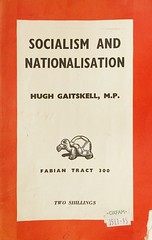or What’s Become of the Common Good? is a book by Michael J. Sandel. You will without doubt find people speaking kindly of it,
. For my part, I think it a poor book badly written.
Of course, it is not entirely without merit (fnarrr). It correctly notices that those who have risen through their own merit may well come to believe that they have risen through their own merit, and disdain those who have not so risen; whilst those who have failed to so rise may come to despair. Unfortunately, that's pretty well it for the good bits. And when his editor said "that's an excellent start Michael but I'm afraid you'll have to pad it out a bit" he duly did so.
Eventually (p 125) he comes to consider two other systems: free-market liberalism (a-la Hayek) and welfare state liberalism (a-la Rawls). He presents Hayek giving exactly my argument. He presents Rawls saying... something, but I didn't pay much attention; I already know I disagree with Rawls. So how does he get rid of Hayek's view? He doesn't. He just says "morally and psychologically, the distinction between merit and value becomes vanishingly thin". But this is no answer to a defence of "true" meritocracy. It only leaves him the rather thin "disdain" idea.
The assertion (p 136) that Hayek doesn't understand that things other than market value, have value, is drivel. So what we get is a fatal problem for his theory: market value isn't moral worth. His answer (again, p 136) is to take market value as a proxy for social contribution, which is lying worthy of Plato6.
In his version, free-market liberalism differs from meritocracy. In mine, it doesn't5.
There's some discussion of social mobility, and of credentialism. This discussion is somewhat confused because whilst vaguely related to meritocracy the connection is weak, and he isn't ever clear whether he means true, false, or well-that's-what-you-see-in-the-world meritocracy.
His solution
By p 155, we begin to come to his solution. Should we go back to hiring based on prejudice? Fortunately, he doesn't suggest that, though his "does not mean that merit should play no role in the allocation of jobs" is rather weak. Presumably, he does think that something other than merit should play a (substantial?) role - but he doesn't say what that thing or things should be. But his main suggestions are about education, and work.
Because he is a Harvard professor, he disdains to think about anything as plebian as early education, and instead thinks only about college. He asks (p 169), should higher education retain its role as arbiter of opportunity? As soon as you ask this question you - but not, alas, our author - realise that the answer is that "should" is again wrongthink. No-one has designed or legislated the system that way; it has simply grown up, as a result of many many choices, and so there is no "should". To change it... where would you even start? He doesn't know, so instead proposes making entrance into Harvard more of a lottery.
As to "work", his idea appears to be recognising the dignity of labour3. Unfortunately, he then decides that the most important role we play in the economy is as producers, not consumers2. There may be points of view (his is "civic conception") from which this makes sense; but it is also the all-too-common view that leads to protectionism and other such stupidity; so it is a dangerous idea to push. It gets worse; he realises that our wages don't represent our true "value" - see above - but instead says that our true value is (p 209) the "moral and civic importance" of our work, As though that can in any meaningful way be evaluated. Instead it just leads to the politics of envy: "my morality says you are not worth your wages", an all-too-common view... which he proceeds to display, in discussing finance, lower down: did you know, some of those dirty financiers get more than Harvard professors do?
Anyway, back to dignity of labour. He's for it. It is important to our self-esteem, and so on. But - ironically, he too has confused meanings of value - he means people getting decent-paying jobs. His ideas for achieving this, though, are thin and vague: "some restrictions on trade, outsourcing, and immigration" - i.e., protectionism; more of Trump. No thank you.
But he has another idea about work. First he begins by making an all-too-common mistake: that the finance industry is non-productive. His solution? A financial transactions tax. Which is fuckwitted, albeit all-too-often popular. The EU is in favour of it: need I say more? But... as a solution to societies problems, it is weak to the point of confessing that you don't really have any solutions.
P 210: cites
Hegel as a reference for his ideas. FFS. Has he no shame; has he not read Popper? That seems a good point to end this review.
What would you do instead?
Once you, unlike our author, realise that meritocracy is just free-market liberalism, the answer becomes obvious: don't do something else. Don't read this book; read Hayek instead.
Update: practical politics
Reading
the Graun (a crap article that upholds the usual journalistic practice of beginning with several paragraphs of irrelevance) I find
The Tyranny of Merit is Sandel’s response to Brexit and the election of Donald Trump. In this review I've largely ignored the practical politics side, because I was more interested in the idealised, theoretical view. The book doesn't really distinguish the two; we swap from one to another and back as we go along. So, a better book would have much more sharply distinguished the two.
The idea that the "metropolitan elites" look down upon the "proles" is a commonplace, though. Our author gets no points for that. He would get points if he could clearly tie that attitude into his theorised meritocratic disdain. But other than hand-waving, he doesn't do that. Did the Lords of say 16th century England despise the peasants of their day? In my image of the times, yes; on our author's theory, they shouldn't have; or at least, less than the ME do today. Do you believe that? I'm doubtful.
As to the "disdain effect", I think he remains confused, as to whether it means meritocracy is overall a bad thing, or whether it is merely a defect in meritocracy. For example, from the Graun: Even a perfect meritocracy, he says, would be a bad thing. “The book tries to show that there is a dark side, a demoralising side to that,” he says. Notice the contrast of the Graun's "a bad thing" and his "dark side". So if it is merely a defect, then how much of a defect is it? It could just be a minor one - I think it is - hardly worth much worrying about. How would you know? Simply repeatedly emphasising that the defect exists gets you nowhere.
Update: Book Review: The Cult Of Smart by Fredrik DeBoer by SSC/AST
This review touches much of the same ground, ending with a plea against formal educattion.
Update: another virtue of meritocracy
I think this review was mostly a dissection of TTOM, rather than a detailed defence of Meritocracy itself. But I think I should in arrears (2022) add in something else that occurs to me: at least with rewards derived meritocratically, those who strive for those rewards are striving in useful productive ways. Whereas if you are distributing your rewards based on race, sex, disability or class, people striving for such rewards are doing so unproductively.
Update: Justice
On perusing our bookshelves I find
Justice: What's the Right Thing to Do? by you-know-who. It is lightweight poppy tome that I don't propse to review properly; it starts off being unable to decide about price-gouging, but has gone hopelessly wrong in a predictable way by page 19, "the approaches to justice" where he says "A just society distributes these goods in the right way; it gives each person his or her due. The hard questions begin when we ask what people are due, and why." But of course "what people are due" is the exact duff question he has flunked here; it is no good starting with that as a postulate, and thus being forced to proceed from there to unanswerable questions.
Notes
1. He doesn't do a good job of defining just (rather as Plato fails) and the word is susceptible to intuitions. Fortunately his discussion around p 124 is sufficiently muddy that an exact definition would not help. For myself, I prefer Hobbes' defn: that which is not unjust. And what is unjust? Breaking covenants. Therefore, a meritocracy is just. As is a dictatorship. Which just shows you that it isn't a good question.
2. He then compounds his error by asserting that consumption-is-primary is "today so familiar that it is hard to think our way beyond it", quoting the Sainted Smith. Again, his thinking is muddled: this is the primary view of std.economics, but not of the public, and not of pols.
3. Dignity of labour is a good idea. But the trouble is that is what it is: an idea; a state of mind; an opinion. Anyone can have it. Anyone flipping burgers at MacDonalds can have it. But our author is not brave enough to argue that people should think like that. Because he has fallen into his own traps: he has confused value with dollar-value. The idea of burger-flipping fills him with horror, and he cannot really conceive of anyone doing that having any dignity in their labour; he is, in the end, a snob.
4. Of course, he could solve this problem by clearly defining meritocracy, in his favour. If it means "rewarding good work / good deeds (merit) because people of merit deserve (in a moral sense) those rewards", then he'd be OK. But in his characteristically mushy way - in stark contrast to Popper - he never does define meritocracy, as
HarvardMag notes. They suggest defining it as Amartya Sen suggested:
a system for “rewarding good (or right) deeds for their incentive effects, but that's
my defn, because of the use of "incentive" rather than "deserve".
5. If your prejudices lead you to think that think implies that "that the only gauge of merit is what it can be sold for" then you really need to work on your prejudices. Or, you can try reading the comments.
6. Since it comes my way, I offer you "Were she to encounter Françoise at the moment (which Françoise called “the noon") when, wearing her fine cap and surrounded with every mark of respect, she was coming down stairs to "feed with the service," Mme Villeparisis would stop her to ask after us. And Françoise, when transmitting to us the Marquise's message: "She said to me, 'You'll be sure and bid them good day,' she said," would counterfeit the voice of Mme de Villeparisis, whose exact words she imagined herself to be quoting textually, whereas in fact she was distorting them no less than Plato distorts the words of Socrates or St John the words of Jesus. Françoise was naturally deeply touched by these attentions. Only she did not believe my grandmother, but supposed that she must be lying in the interests of class (the rich always supporting one another) when she assured us that Mme de Villeparisis had been lovely as a young woman. It was true that of this loveliness only the faintest trace remained, from which no one-unless he happened to be a great deal more of an artist than Françoise would have been able to reconstitute her ruined beauty. For in order to understand how beautiful an elderly woman may once have been one must not only study but translate every line of her face". From Place-Names: The Place.
Refs
 Not the real supreme court, of course, just the UK one. From the Beeb:
Not the real supreme court, of course, just the UK one. From the Beeb:


